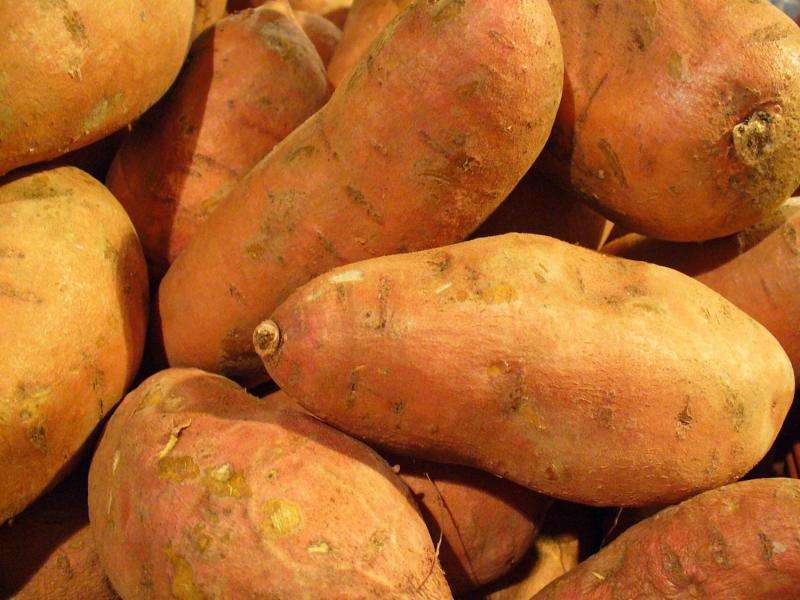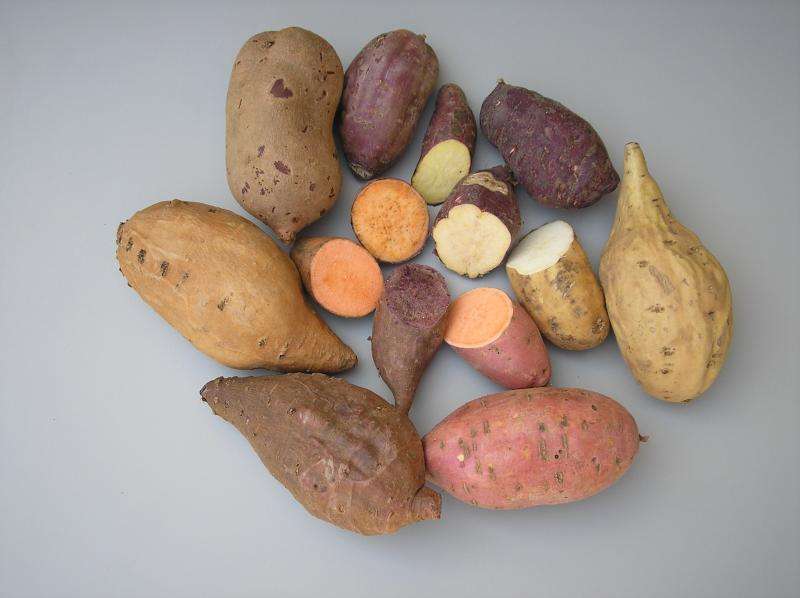April 21, 2015 report
Researchers find the genome of the cultivated sweet potato has bacterial DNA

(Phys.org)—A team of researchers with members from Belgium, China, Peru and the U.S. has found evidence of bacterial DNA in the genome of the cultivated sweet potato. In their paper published in Proceedings of the National Academy of Sciences, the team describes their findings as an example of a naturally occurring transgenic food crop.
In modern times, scientists have created what are known as genetically modified organisms (GMOs), where plants or animals are modified to suit the particular needs of people in a certain region—to allow corn to grow in a dry climate for example. One common method of creating GMOs is to use bacteria that have been found able to modify the genes of a host as a carrier agent. GMOs have been met with suspicion in many parts of the world with some places banning them outright. Now, in this new effort, the researchers have found an example of a natural GMO that people have been eating for thousands of years: the sweet potato.
Sweet potatoes have been growing wild in South America for thousands of years—over time, they were cultivated by people, and have since become a popular food in many parts of the world. But now it appears that a type of bacteria similar to the kind used by modern scientists to create many GMOs found its way naturally to cultivated sweet potatoes many generations ago and modified its DNA. To make this discovery, the researchers collected 291 sweet potato samples from cultivated sources across the globe along with nine wild sources and subjected them all to DNA analysis—they found that all of the cultivated potatoes carried at least two stretches of Agrobacterium DNA, while the wild species carried one. Their findings suggest the transfer of DNA to the potatoes occurred a long time ago, before they were carried to and grown in other parts of the world.

The researchers suggest their findings could have an impact on the perception of GMOs by some who oppose their creation on the grounds that it is not safe. They claim that humans eating food that was genetically modified naturally, over thousands of years, proves that such foods are not harmful.
More information: The genome of cultivated sweet potato contains Agrobacterium T-DNAs with expressed genes: An example of a naturally transgenic food crop, Tina Kyndt, PNAS, DOI: 10.1073/pnas.1419685112
Abstract
Agrobacterium rhizogenes and Agrobacterium tumefaciens are plant pathogenic bacteria capable of transferring DNA fragments [transfer DNA (T-DNA)] bearing functional genes into the host plant genome. This naturally occurring mechanism has been adapted by plant biotechnologists to develop genetically modified crops that today are grown on more than 10% of the world's arable land, although their use can result in considerable controversy. While assembling small interfering RNAs, or siRNAs, of sweet potato plants for metagenomic analysis, sequences homologous to T-DNA sequences from Agrobacterium spp. were discovered. Simple and quantitative PCR, Southern blotting, genome walking, and bacterial artificial chromosome library screening and sequencing unambiguously demonstrated that two different T-DNA regions (IbT-DNA1 and IbT-DNA2) are present in the cultivated sweet potato (Ipomoea batatas [L.] Lam.) genome and that these foreign genes are expressed at detectable levels in different tissues of the sweet potato plant. IbT-DNA1 was found to contain four open reading frames (ORFs) homologous to the tryptophan-2-monooxygenase (iaaM), indole-3-acetamide hydrolase (iaaH), C-protein (C-prot), and agrocinopine synthase (Acs) genes of Agrobacterium spp. IbT-DNA1 was detected in all 291 cultigens examined, but not in close wild relatives. IbT-DNA2 contained at least five ORFs with significant homology to the ORF14, ORF17n, rooting locus (Rol)B/RolC, ORF13, and ORF18/ORF17n genes of A. rhizogenes. IbT-DNA2 was detected in 45 of 217 genotypes that included both cultivated and wild species. Our finding, that sweet potato is naturally transgenic while being a widely and traditionally consumed food crop, could affect the current consumer distrust of the safety of transgenic food crops.
Journal information: Proceedings of the National Academy of Sciences
© 2015 Phys.org



















